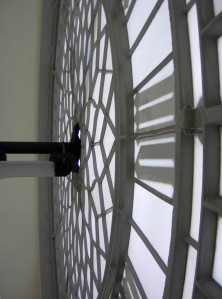Bless me, Father, for I have sinned. It’s been two weeks since I last went to work . . .
In recent conversations with my sister, the word “shirking” was mentioned a few times. Growing up, shirking—the avoidance or neglect of duty—was Mortal Sin #1 in our mother’s book (followed closely by “imperfect result or performance”). Every day, every waking hour, was to be filled with purposeful activity. Productivity was the point. Recreation (where allowed) usually had a secondary educational goal.
My father was not as involved with this mindset. Though he worked long hours, and his off-days were regularly spent making repairs, improving our home, keeping cars in tune, and such, his recreation had no ulterior motive. His enjoyment of the 49ers’ football games was pure, and I long suspected that the point of his lazy Saturday’s spent surf-fishing was not, in fact, to catch fish.
But Dad’s counterpoint to Mom’s stricter zeitgeist really didn’t stand much of a chance and, in the end, didn’t make a dent in our training. As a result, my sister and I always and still find it difficult to stand down, take a breath, chill, relax. Everything must have a goal, a purpose.
Two weeks ago, I retired, ending forty-six years of employment, and in the time since, I’ve been busy. I’ve been doing chores (cooking, groceries, paying bills), handling situations (rolling over the 401(k), confirming insurance switchover), and even embarking on some larger projects (traction strips for the front steps, installing new raised beds). But I’ve also (usually at my wife’s suggestion) been taking time to enjoy some shows, read a little, and take walks. I thought I was doing pretty well.
But last night, my brain screwed up and showed its hand.
I was in bed, prepping for sleep and took a few minutes to plan the next day’s activity. The internal dialogue went something like this:
• Okay, tomorrow’s Sunday; the weather is supposed to be fine—mostly sunny, high of 62°F.
• Don’t want to waste the weather; outdoor activity should be a priority.
• I could work more on the front steps, scrape and grind to prep the surfaces.
• Should also see if we have any of that paint color left . . . Adirondack Brown, was it?
• Don’t want to get too deep into that. Don’t start anything that can’t be left for a while.
• Hmmm, what? Why?
• Only one day to spend on it; gotta go back to work on Monday. It’s been a nice two-week break, though.
At this point I heard/felt a click, in my head, like a physical switch being thrown.
Brain, you’ve been busted.
My subconscious had obviously not gotten the memo about our retirement; it was still operating as if I was only on vacation. It’s as if, deep down, I don’t really believe I’ve retired. That, or retirement is just too foreign a concept for my lizard brain to comprehend.
So, subconscious and I had a conversation wherein we discussed both the nature of forever and the fact that not every moment needs to have a goal.
Obviously, this is going to take more time than expected to truly sink in. The longest time-off I’ve ever had was a three-week vacation, so as far as I can tell my subconscious is now working on that premise, and we’ll need to have a similar conversation next week. But if that’s needed, we’ll have it, and again the week after, if required.
I’ll get there. Even if I have to drag my subconscious along, kicking and screaming.
k






 Unraveling Time
Unraveling Time Desert Wind
Desert Wind Ploughman's Son
Ploughman's Son Ploughman King
Ploughman King The Year the Cloud Fell
The Year the Cloud Fell The Spirit of Thunder
The Spirit of Thunder Shadow of the Storm
Shadow of the Storm The Cry of the Wind
The Cry of the Wind Beneath a Wounded Sky
Beneath a Wounded Sky Cryptogenesis: A Memoir
Cryptogenesis: A Memoir